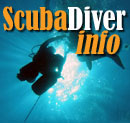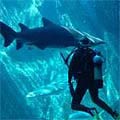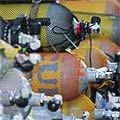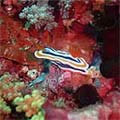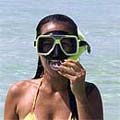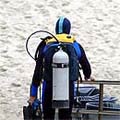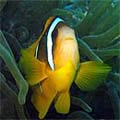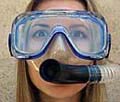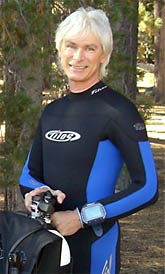« The Florida Springs | Main | Free diving »
March 26, 2008
Mark Fyvie (1972-2008)
People die every day, by the thousands. From natural causes and from accidents. Unless a death happens in our families or we are confronted with it in some other way, we barely notice. Even the gruesome stuff we see on television or read in the newspapers doesn't really affect us. This only happens to other people, not us. But every once in a while a death does affect us. It can be a celebrity, like Princess Di or Steve Irwin, the Crocodile Hunter. And sometimes a death affects us just because we can somehow relate, through some connection. That's what happened to me when I read about the death of Mark Fyvie. He died on March 10, 2008 inside the Ginnie Springs cave system in Florida.
Running the scubadiverinfo.com site, I get almost every diving-related accident notice via Google news. I don't post them but file them away. It makes no sense to highlight just the danger and the bad things that can happen. Life is dangerous, even one's bathroom where most domestic fatalities occur. I don't see Better Homes & Gardens Magazine report on that very often. It's not necessary.
I first heard of this accident after Carol's certification trip to Ginnie Springs. A cave diver had died the week prior. He had been deep inside the cave system. There had been silting of the system as a result, it was said, and apparently the diver had gone in there by himself with experimental rebreather equipment. I looked it up on Google News and found just three references to it. Compared to the international coverage of the shark-related death during a shark feeding trip, that's a virtual news blackout. In fact, it was just the Gainesville Sun and the local High Springs Heralds that reported at all, or at least that is what Google picked up.
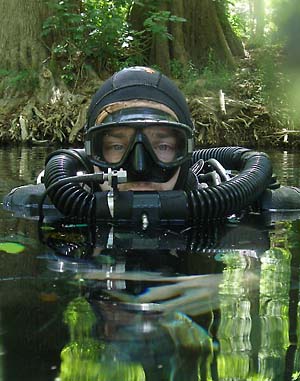 The reports were brief, but what caught my eye was that this was a diver from my native Switzerland. His name was Mark Fyvie, and the paper reported he'd been diving alone, entering the Ginnie Springs underground and underwater caves through the Devil's Eye entry just past noon. When he had not returned by 9pm, another diver by the name of Corey Mearns went looking for him, and Mark Fyvie was found 3,800 feet into the system. The IUCRR (International Underwater Cave Rescue and Recovery) non-profit posted a new thread on the cavediver.net forum entitled "Fatality beyond the Hinkel" in the afternoon of March 11. The report said the diver had used a side mount/no mount rig for passage through a suspected new lead. It was reported that an IUCRR recovery team brought out the body at 9AM on March 11.
The reports were brief, but what caught my eye was that this was a diver from my native Switzerland. His name was Mark Fyvie, and the paper reported he'd been diving alone, entering the Ginnie Springs underground and underwater caves through the Devil's Eye entry just past noon. When he had not returned by 9pm, another diver by the name of Corey Mearns went looking for him, and Mark Fyvie was found 3,800 feet into the system. The IUCRR (International Underwater Cave Rescue and Recovery) non-profit posted a new thread on the cavediver.net forum entitled "Fatality beyond the Hinkel" in the afternoon of March 11. The report said the diver had used a side mount/no mount rig for passage through a suspected new lead. It was reported that an IUCRR recovery team brought out the body at 9AM on March 11.
I then searched through Tages Anzeiger, the big local newspaper in Zurich, Switzerland but did not find a mention. However, I quickly found Mark Fyvie's website and this is where everything became very emotional. Zurich is my hometown. I grew up there. Zurich Divers, which he started and ran, was Mark Fyvie's diving homebase. His personal site was not in German but in flawless English, which surprised me. I can usually tell translations from German into English, but his English was perfect.
I saw Mark's credentials. He'd been diving since 1993 and a diving instructor since 2000. He had almost a thousand dives to his name. He was a PADI IDC Staff Instructor, an Emergency First Response Instructor Trainer, a DSAT Tec Trimix Instructor, a DSAT Gas Blender Instructor, and an IANTD Technical Cave Instructor. He was also certified as a Closed Circuit Rebreather cave diver, Trimix diver, cave scooter diver, and specially trained on the Megalodon rebreather. So Mark was certainly no noob or amateur. A look at Mark's diving highlights is a trip around the world. He'd been diving and cave diving all over the place, with extensive cave diving, sometimes weeks at a time.
Mark reported on a two week dive trip to the Ginnie Springs area where they'd penetrated 3,800 feet, past the Hinkel restriction. In April of 2007 he did his Megalodon training with a true diving legend, Jill Heinerth of RebreatherPro.com, and Jill was highly complimentary of Mark both as a person and as a skillful diver. Mark himself, on his site, was completely aware of the pros and cons of rebreathers. "Some people who dive rebreathers think that once you buy one you must do every single dive with it." Mark wrote, "I don't agree at all. A CCR is a dangerous device that could kill you at any time, why take the risk of using one on a simple dive that could be done more safely with open circuit?"
Another entry from November 2007 describes a full month of cave diving with the Megalodon rebreather in the Americas. This is where he got his CCR Cave and CCR Trimix certifications and also descended down to 272 feet in Eagle's Nest. He was enthusiastic and wrote, "Now I realise what closed-circuit rebreathers are for - it's totally changed the way I can dive caves." He went on to say, "The bad part is finding a dive buddy for this kind of diving. Even in cave country it's tough and I had to do most of the dives alone. ... Now, feeling rather limited by the duration of my CO2 scrubber, I purchased a new radial scrubber, which should easily be able to handle durations of up to ten hours. I can't wait until my next trip in February."
Again I was surprised by the consistently high quality of his English, then found that Mark wasn't Swiss. He'd been born in South Africa, then had lived in New Zealand, Australia, England, Germany and finally Switzerland. He was truly an international citizen, always traveling and exploring new things and places. Switzerland was not going to be his final destination and even after having been away from my native country for over 30 years, I chuckled at Mark's comment that he yearned "for a place where he can shop on Sundays, take a shower after 10pm". It's true. Your neighbors may call the police if you take a shower after 10pm, shops are rarely open, bars close early and at least in my days, you had to register with the police if you moved from one neighborhood to another.
What made me cry was another part of his website. It was about his wedding. He had proposed to his sweetheart and they were going to get married on September 6th of 2008 in Venice. Mark had it all planned out, described every step. He had his whole life ahead of him. It is just so very sad.
At this point I was abundantly clear that this was not just another reckless diver who didn't know what he was doing. This was an extremely accomplished, very smart man who planned meticulously and left nothing to chance. I have done quite a few things in my life, have moved around, seen many different places, have had different careers, but nothing like Mark who was only 36 years old when he died. Looking at his many other interests, I saw that he'd been learning Japanese and wanted to live there someday, was enthusiastic about biodiesel in Australia, Pilates training in Switzerland, all on top of being a certified Cisco engineer.
But there was more. Mark also initiated a discussion forum for English speakers in Switzerland, the englishforum.ch. There was a need for that as Swiss German is as close to a legal secret code as it gets. Mark had commented that while "he was fluent in German, he was completely baffled by Swiss-German and unable to understand even more than a few words." That's because you cannot learn Swiss German. It is only a spoken language. So Mark created a place to help English speakers in the Swiss society. I know the software he used as I use it to run a large forum/community myself. His setup was, of course, completely up-to-date and nicely customized. An "In Memoriam: Mark Fyvie (1972-2008)" was posted on March 13. Within days it had over 300 replies and testimonies to what a great and wonderful person he'd been and how many he had helped. His work had touched people's lives. From all I read about him, I guess he just couldn't help helping others.
Jill Heinerth herself wrote a post and tribute to Mark, her student and friend. She said Mark was a "peer among a very elite group of the world's extremely accomplished and capable technical divers" and that "Mark contributed more to the cave diving community than can ever be measured." In a eulogy on her own website at rebreatherpro.com, Jill wrote "But the reality is that manipulating your own atmosphere for life support is the most dangerous thing you will ever do. Add to that advanced activities like cave diving and exploration and we are on the razor’s edge."
In the end, Mark's time was up, much too soon. In my reading I have often come across divers' frustration when a fatality is simply dismissed as drowning, leaving up to speculation what actually may have happened, and why. Sometimes it's obvious, often it is not. The Megalodon is a rugged, modular and highly regarded electronically-controlled closed circuit rebreather with redundant electronics and a HUD display made by InnerSpace Systems. Mark had indicated he had purchased a radial instead of the standard axial scrubber. The radial scrubber would be able to last as much as ten hours underwater. Inner Space says CisLunar scrubbers also work on the Megalodon and according to an evaluation of the Meg on spiralbound.net, others do as well, though only the CisLunar is mentioned as being radial. Whether or not that made Mark's unit experimental I don't know.
Now one is not supposed to dive solo, though I've read of many wreck divers who feel solo is actually safer under certain conditions where panic can easily result into two fatalities instead of one rescue. As is, my Cavern/Cave Diver Workbook by the National Association for Cave Diving says to "dive with a properly trained and equipped diving partner and maintain diving team continuity throughout the dive." However, that only seems to be a philosophy and not a requirement. As far as safe cave diving goes, "The NACD strongly advocates diving with a partner as the best approach to safe cave diving." Mark had already concluded that finding a suitable buddy for extended time diving was difficult and that he had to do most of his dives alone.
It is equally important to let others know one's dive plan in case something goes wrong. His dive plan was known as he was enthusiastic about his plans and wanted to share with his friends, and at least that aided in the recovery.
The rest is mystery. I'll likely never know what happened, exactly, and it is none of my business. I did not know Mark personally, but his story, so well documented, deeply touched me. May he rest in peace and his loved ones find some sort of solace, nearly impossible though that is.
Posted by conradb212 at March 26, 2008 8:23 PM
